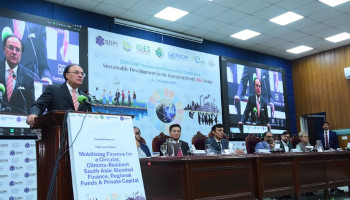
Pakistani investors may have pumped between $20 billion and $30 billion into crypto-linked assets, experts at the annual conference of the Sustainable Development Policy Institute said, urging the government to act fast and create a regulatory framework before Pakistan misses a big economic opportunity.
The volume of crypto trading in Pakistan is difficult to determine due to the lack of a legal framework that acknowledges and tracks virtual asset transactions, speakers said.
Some estimates put potential trading volumes at $300 billion, close to the South Asian nation’s approximate $400 billion GDP.
The experts recommended a gradual and cautious approach to legalisation, emphasising that weak regulation and vulnerabilities in cybersecurity may leave consumers open to fraud and financial instability.
They recommended starting off with the Central Bank Digital Currency (CBDC) for lower remittance costs and bringing digital transactions within the ambit of the government.
According to a statement by Pakistan Banks Association President Zafar Masud, the country could capture $20–25 billion in economic gains if it acts early.
Pakistan is "seriously considering a rupee stablecoin" as part of the transition, he said, but cautioned that cybersecurity risks and negative public perception remain hurdles.
Officials from the State Bank of Pakistan confirmed that work on a digital currency prototype has been ongoing since 2022, with support from the World Bank and IMF. A pilot phase is expected after testing.
















